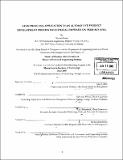Lean principle application in an automotive product development process with special emphasis on peer reviews
Author(s)
Boren, Michael S. (Michael Stuart)
DownloadFull printable version (44.62Mb)
Alternative title
Lean principle application in the General Motor's product development process with special emphasis on peer reviews
Other Contributors
Leaders for Manufacturing Program.
Advisor
Sebastian Fixson and Eric Rebentisch.
Terms of use
Metadata
Show full item recordAbstract
Global Automotive, a large US based, global manufacturer of automobiles, has made significant gains in manufacturing competitiveness, in part through application of a lean manufacturing approach to high volume assembly. A similar approach applied to product development can result in significant improvements in product design throughput, speed, cost, design quality, and innovation. With major product programs taking in excess of 36 months and a billion dollars to complete, the potential impact of process improvements is substantial. This thesis examines elements of Global Automotive Product Development Process. Some general guiding principles for Lean product development are also reviewed from the existing literature. Special attention is given to metrics for measuring product development performance at Global Automotive. The thesis focuses on the role of peer reviews in the development process. The analysis is performed using a work order data set for two automotive development programs. Score cards from Peer Review and a survey of the component engineering community are also used to assess the effectiveness and current state of the peer review process. The study found evidence that high scores on peer reviews do not guarantee that late changes will occur, if anything component groups with average lower scoring peer reviews generated led to consistent levels of late stage changes. The objective of peer reviews should clearly be to find as many problems as possible and participants should be encouraged to delivery "low scoring" reviews. Keywords: Product Development, Lean, Peer Reviews, Design Defects.
Description
Thesis (M.B.A.)--Massachusetts Institute of Technology, Sloan School of Management; and, (S.M.)--Massachusetts Institute of Technology, Engineering Systems Division; in conjunction with the Leaders for Manufacturing Program at MIT, 2009. Includes bibliographical references (p. 94).
Date issued
2009Department
Leaders for Manufacturing Program at MIT; Massachusetts Institute of Technology. Engineering Systems Division; Sloan School of ManagementPublisher
Massachusetts Institute of Technology
Keywords
Sloan School of Management., Engineering Systems Division., Leaders for Manufacturing Program.